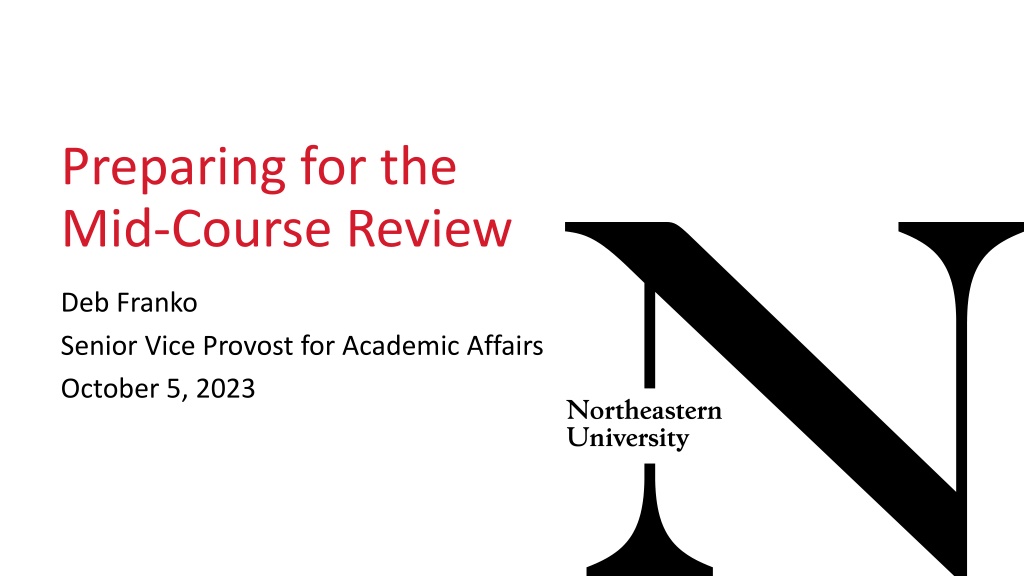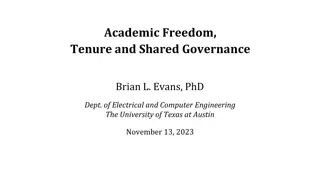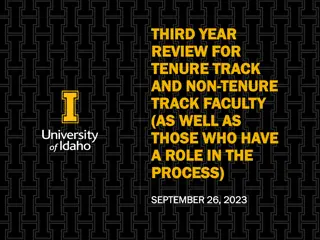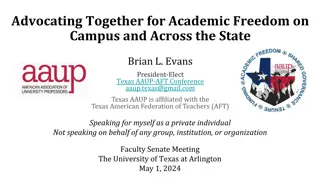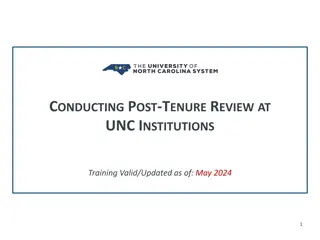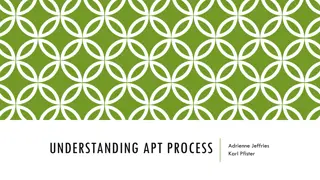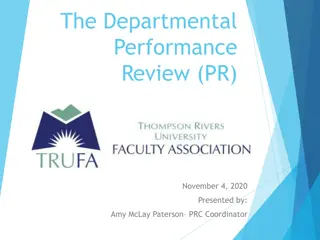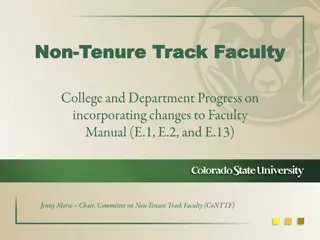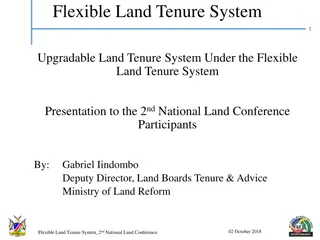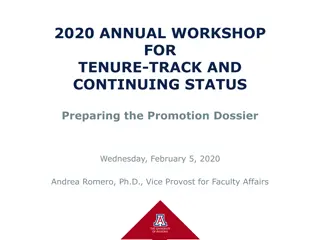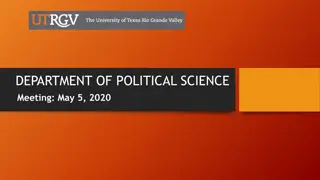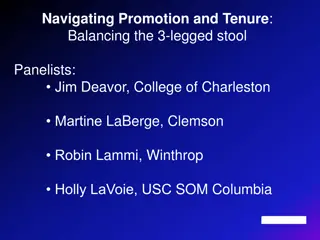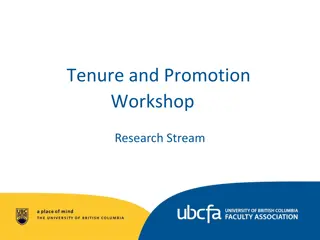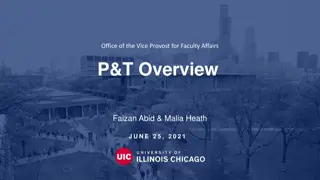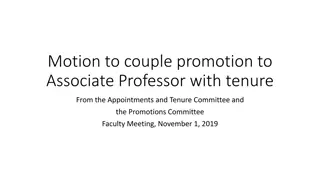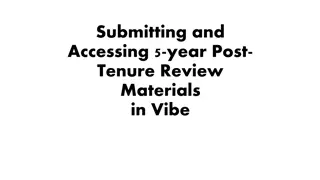Understanding the Mid-Course Review for Tenure-Track Faculty
The Mid-Course Review is a pivotal assessment for tenure-track faculty, evaluating their progress in teaching, scholarship, and service midway through the tenure process. Conducted by unit tenure committees, it provides recommendations for reappointment or non-reappointment, serving as a crucial step towards tenure consideration.
Uploaded on Sep 26, 2024 | 0 Views
Download Presentation

Please find below an Image/Link to download the presentation.
The content on the website is provided AS IS for your information and personal use only. It may not be sold, licensed, or shared on other websites without obtaining consent from the author. Download presentation by click this link. If you encounter any issues during the download, it is possible that the publisher has removed the file from their server.
E N D
Presentation Transcript
Preparing for the Mid-Course Review Deb Franko Senior Vice Provost for Academic Affairs October 5, 2023
WHAT is the Mid-Course Review? A review of your work that takes place in the spring of the third year or early in the fourth year of the tenure clock. Like the annual review, assesses tenure-track faculty member s progress in all three areas of performance required for tenure consideration teaching, scholarship, and service. 2
Process of the Mid-Course Review The review is conducted by unit tenure committee based on a dossier of work to date in format of the final tenure dossier. Committee writes report which you and the college dean receive. Outcome: Recommendation for reappointment (may be with additional review) or non-reappointment by the dean. 3
Faculty Handbook https://faculty.northeastern.edu/handbook/appointments-promotion-and-tenure/tenure/ PRE-TENURE REVIEW During the third or fourth year, the unit tenure committee will conduct a comprehensive review of performance relative to the university s criteria for tenure. Each unit will develop procedures for this review. The review will culminate in a written evaluation that makes a recommendation for reappointment or non-reappointment. Where reappointment is recommended, the review must discuss strengths and weaknesses, and areas that require development for continued progress toward tenure. The unit head will discuss the written evaluations with the faculty member and place a copy in the faculty file. The review will be forwarded to the dean. If the dean disagrees with the evaluation and/or recommendation of the unit, the dean transmits to the review committee the reasons for disagreement. The dean s decision in this matter is final, subject only to the review and determination of the provost on appeal by the faculty member. 4
Timing of Mid-Course Review Faculty Handbook: During the third or fourth year ..the unit will conduct a comprehensive review .. 3rd year: Report should be completed shortly after spring term and sent to dean in May 4th year: Report should be completed and sent to dean by mid- October 5
Think of the mid-course review as a dress rehearsal for tenure. 6
Faculty with Interdisciplinary Appointments The committee responsible for conducting a pre-tenure review includes one representative from each unit in which candidate holds a secondary appointment. Secondary unit faculty selects representative (of appropriate rank and area of expertise). Dean of tenure home unit consults with secondary unit dean before making decision on reappointment. 7
WHY is there a mid-course review? Takes a longer perspective than annual review of progress. Thorough review at a point advanced enough to make evaluation meaningful, but early enough to change course to correct problems or change commitments. Ensures that candidates have experience with dossier-building before crunch time. In interdisciplinary appointments, incorporates perspective of all faculties and deans concerned. 8
How do I prepare for the mid-course review? Talk to your mentor, associate dean for faculty, and/or your department head about department and college guidelines. If jointly appointed, ask about involvement of your secondary unit. Become familiar with the university-wide dossier requirements embodied in the Model Tenure Dossier https://provost.northeastern.edu/app/uploads/Updated-Model-Tenure-Dossier_July-1-2021.pdf 9
Mid-Course Review Dossiers: Electronic Length for midcourse review: Aim for ~40-50 pages. Dossiers must follow order of Model Dossier checklist. Order, organization, and page limits matter. 10
Developing Your Materials Efficiently Looking toward your electronic tenure dossier, you should: Maintain files to be included in the tenure dossier in electronic formats (with backup!). Ask for documents (e.g., annual performance reviews) from your department/college in PDF format or scan paper documents you may already have on file. 11
Mid-Course Review Dossier Materials supplied by the candidate: Curriculum vitae Candidate s Statements: 1. Teaching Statement and TRACE Summary Table 2. Research and Scholarship Statement 3. Service Statement Performance Reviews 1. Annual reviews 2. Merit reviews 12
The Mid-Course Review Dossier: Appendices Teaching: Supporting documents Raw teaching evaluations (TRACE reports with comments, department-specific evaluations) Advising activity (undergraduate/graduate) Sample syllabi and teaching materials 13
The Mid-Course Review Dossier: Appendices Scholarship, Research, Creative Activity: Supporting documents Copies of all publications Book reviews, citations, other evidence of impact If work is collaborative, co-author letters about your specific contribution Research awards and honors Recommendations for publication, other evidence of work in progress 14
The Mid-Course Review Dossier: Appendices Service: Supporting documents Evidence of committee-based contributions to dept/college/university Other contributions to dept/college/university Contributions related to your discipline outside of Northeastern 15
WHAT should I take away from the mid-course review? A long start on the documentation needed for tenure. A chance to reconstruct any missing pieces now rather than at crunch time. An assessment of your record-keeping habits to make them serve you. 16
WHAT should I take away from the mid-course review? A chance to stand back from your career to date and tell your story in your statements about teaching, research, and service. Tell the committee and your dean about your impact in teaching and research. In response, deeply considered advice on how your story is advancing towards tenure. Heed it carefully. 17
Mid-Course Review as Inflection Point for Research Sustainability of research agenda External funding where appropriate Timeline for realization of projects through publication Pipeline of projects beyond dissertation research Supervision of graduate students Independence as investigator/scholar Lead authorship Networks developing beyond dissertation director 18
Mid-Course Review as Inflection Point for Teaching/Service Trajectory of educational contributions Slope and quality of teaching evaluations Contribution to curricular innovation Work with students outside the classroom Trajectory of university and professional citizenship Entry into academically based, influential professional service Slope of involvement in department, college, university Emphasis on quality and impact 19
Mid-Course Review To summarize: The mid-course review is a time to show (and show off) the work you ve done over your first 3 years. You get a review by your department colleagues who let you know how you are doing on your path toward tenure. It s your dress rehearsal. 20
QUESTIONS? 21
Evaluation Survey Please fill out the evaluation survey found on your chair. Thank you. 22
